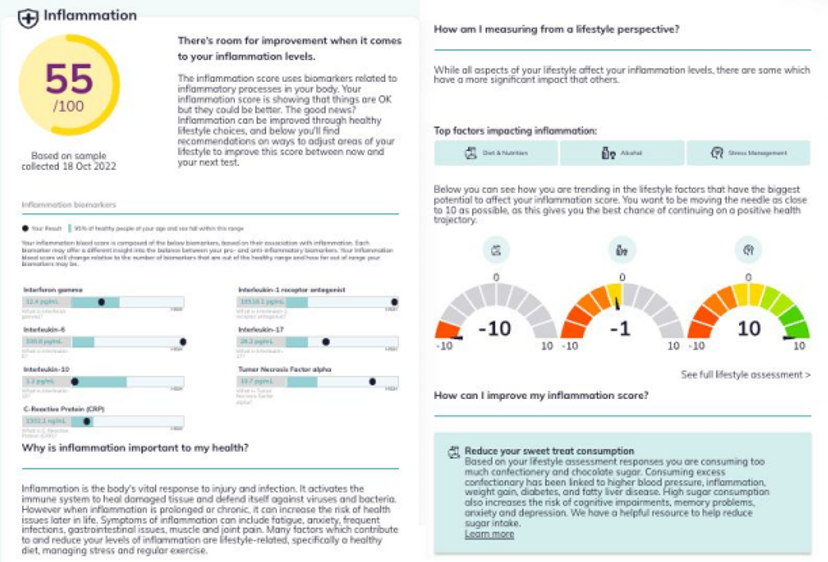How at-home blood tests power self-health management
Study shows accessible blood-biomarker insights and online coaching substantially improve health indicators
12 Oct 2023

An innovative combination of online coaching and at-home blood testing powered by eLabNext’s digital platform is ushering in a new self-health management era with secure and efficient data analysis, paving the way for individuals to gain health insights they can act upon to improve their well-being and expand their health span.
The combinations of actionable blood-biomarker and lifestyle insights provide a solid foundation to enable people's active involvement in their health care, a core component of long-term well-being. This foundation not only guides but can also underpin highly effective early interventions, reducing the risk of disease development and facilitating the management of chronic conditions.
Pioneers of self-health management
In 2018, visionary entrepreneurs Phil Hayes St Clair and Jim Liddle co-founded Drop Bio Health to provide people with a deeper sense of agency and control over their own health by helping them to visualise and easily understand the impact their daily habits have on well-being over time. From conception, their strategy was to design a widely accessible, at-home experience that would transform the way people perceive and manage their health.
Journey to better health
Fast forward to 2022, and Drop Bio Health started enabling its members to collect finger-prick blood samples, answer a comprehensive lifestyle survey and receive results in the comfort of their homes with the WellBeing Test. Most importantly, the company focused on delivering visually engaging health insight reports, featuring an easy-to-digest interface populated with actionable educational resources.
The WellBeing Test groups 25 blood biomarker results into six categories: Energy, Sleep, Stress, Inflammation, Fitness and Body Fat Composition. The reports contextualise the results with the lifestyle assessment, providing people with a set of personalised recommendations designed to improve their well-being and future test results.

“By combining at-home blood testing with personalised lifestyle recommendations, we encourage people to initiate and maintain healthier habits,” says co-founder and Chief Operating Officer Jim Liddle. “Our goal is to empower people to learn more about themselves, taking ownership of their health journey and making more conscious and informed decisions each day, leading to better health over the long-term.”
Elevate the health experience
In April 2023, Drop Bio Health added an extra layer of high-touch online coaching to its user experience with the launch of the InsideOut Challenge. This 8-week health challenge, led by Nutritionist and Exercise Scientist Amelia Phillips, aimed to measure the health impact that combining online coaching with at-home biomarkers and lifestyle analysis can have on a diverse cohort of participants focused on managing their weight.
The program commenced with one WellBeing Test to help baseline participants identify which core health areas needed more attention. Over the following eight weeks, participants engaged in online coaching modules covering sleep, stress, mental well-being, nutrition, and exercise. At the end of the program, the cohort took their second WellBeing Test to assess how they had responded to the lifestyle adjustments.
Critical to the success of this challenge was convenience. Drop Bio Health enabled challenge participants to seamlessly collect their blood samples at home and then deliver accurate results to their secure online accounts in a timely manner. This approach meant the entire cohort could start and complete the challenge simultaneously to maintain engagement and decrease dropout rates.
Transform lives through data
The cohort included 124 participants aged from mid-30s to mid-70s. 89% of the cohort identified as female, and each participant received valuable insights about how daily habits impacted their health.
Across the cohort, the most significant lifestyle improvements1 occurred in three categories: Physical Activity (100%), Stress (100%) and Nutrition (22%). These lifestyle changes were followed by improved blood test results for inflammation (22%) and stress (10%).2
At a cohort level, five noticeable lifestyle changes resulted in improvements in blood biomarker test results, including:
- Increases in the minutes of vigorous exercise from 60 to 77 minutes per week
- Increases in strength training from 1 to 2 times per week
- Increases in the consumption of healthy proteins from 1 to 3 serves per day
- Increases in the consumption of vegetables and legumes from 2 to 3 serves per day and;
- Decreased confectionery consumption
The data indicates that small lifestyle changes can significantly impact well-being in a short period and form the foundation for long-term, sustainable weight and health management.
The cohort’s top 25% of high-performers in terms of weight loss delivered even more positive results. They self-reported an increase in their physical activity scores by an astonishing 291% and a reduction in their stress level score by 300%3 . Their blood test results4 also showed a 31% improvement in stress biomarkers, a 22% improvement in inflammation biomarkers, and an 8% improvement in energy biomarkers.
Regarding lifestyle changes for this sub-cohort, the most significant habit improvements are related to nutrition and exercise. In terms of nutrition, participants increased their intake of proteins, legumes, and vegetables from one to three servings per day and reduced the consumption frequency of processed meats, fast food, and confectionery by ~50%. Exercise improvements were also significant, with minutes of moderate exercise per week improving from 180 to 240 minutes per week, vigorous exercise from 0 to 75 minutes per week and strength training from 0 to 2 times per week.
Empower health
Phil Hayes-St Clair, co-founder and CEO at Drop Bio Health, emphasises the transformative potential of preventative health: “This challenge provided us with evidence that small changes in lifestyle clearly lead to physiological improvements, and people become empowered and further motivated when they can understand their underlying health over time. COVID has taught us the importance of maintaining good health, and now we are in a position to help people take action on their well-being thanks to the safe and high-quality insight we can put in their hands and, soon, in the hands of their clinicians. eLabNext’s platform has been pivotal in enabling us to seamlessly scale our laboratory capacity, analysing and delivering results to a growing number of users efficiently.”, he says.
The digital lab partner
Sample tracking and results are streamlined through eLabNext’s Digital Lab Platform, ensuring secure and efficient data management. eLabNext allows for seamless data analysis and interpretation through its Application Programming Interface (API), enhancing the accuracy and efficiency of our operations.
“eLabNext also plays a fundamental role in facilitating the management of our Data Systems in compliance with ISO 17025 whilst also optimising our information, results and reporting workflows”, says Dr Alamgir Khan, Head of Laboratory Operations at Drop Bio Health.
eLabNext’s controlled access via login credentials helped address multiple ISO/IEC 17025 requirements in relation to sample receipt, processing, recording, reporting, storage and retrieval of data. Sample and equipment tracking in an experiment, completion and signing experiments were also performed within the eLabNext’s digital platform.
Drop Bio Health’s dedicated Lab Digitalisation Specialist, Dr Ramzi Abbassi, says, "Embracing digitalisation in health analysis significantly enhances data usability and reliability. Drop Bio Health's innovative approach exemplifies seamless integration with eLabNext, delivering comprehensible and actionable health insights. Their pioneering commitment streamlines processes and empowers customers with holistic health wisdom, all attainable with a single finger-prick and user-friendly web access. We're privileged to be part of Drop Bio Health's transformative journey!"
Commitment to quality
Drop Bio Health is dedicated to the continual improvement of its product offerings and workflows, with the aim of democratising at-home health monitoring at scale. We are also expanding our capability to utilise chemistry analysers for metabolic panel analysis and immunoassay analysers for hormone analysis. Our mission is to accelerate the world's transition to personalised, preventative health. The basis for achieving that mission is the provision of reliable insights that help people to independently and proactively navigate their health in the right direction as they age.
Unwavering commitment to the highest quality standards while concurrently growing our laboratory capacity to support the growing at-home healthcare market is at the core of Drop Bio Health’s mission, and eLabNext plays an integral role in enabling that mission.
References:
Improvement percentage is based on median lifestyle score changes for the cohort. The lifestyle score is calculated by comparing answers provided in the online survey with national guidelines for sex and age.
Improvement percentages based on median blood score changes. The blood score is calculated by measuring blood-biomarker concentrations against healthy ranges for age and sex (pending publication).
Improvement percentage is based on median lifestyle score changes for the cohort. The lifestyle score is calculated by comparing answers provided in the online survey with national guidelines for sex and age.
Improvement percentages based on median blood score changes. The blood score is calculated by measuring blood-biomarker concentrations against healthy ranges for age and sex (pending publication).

